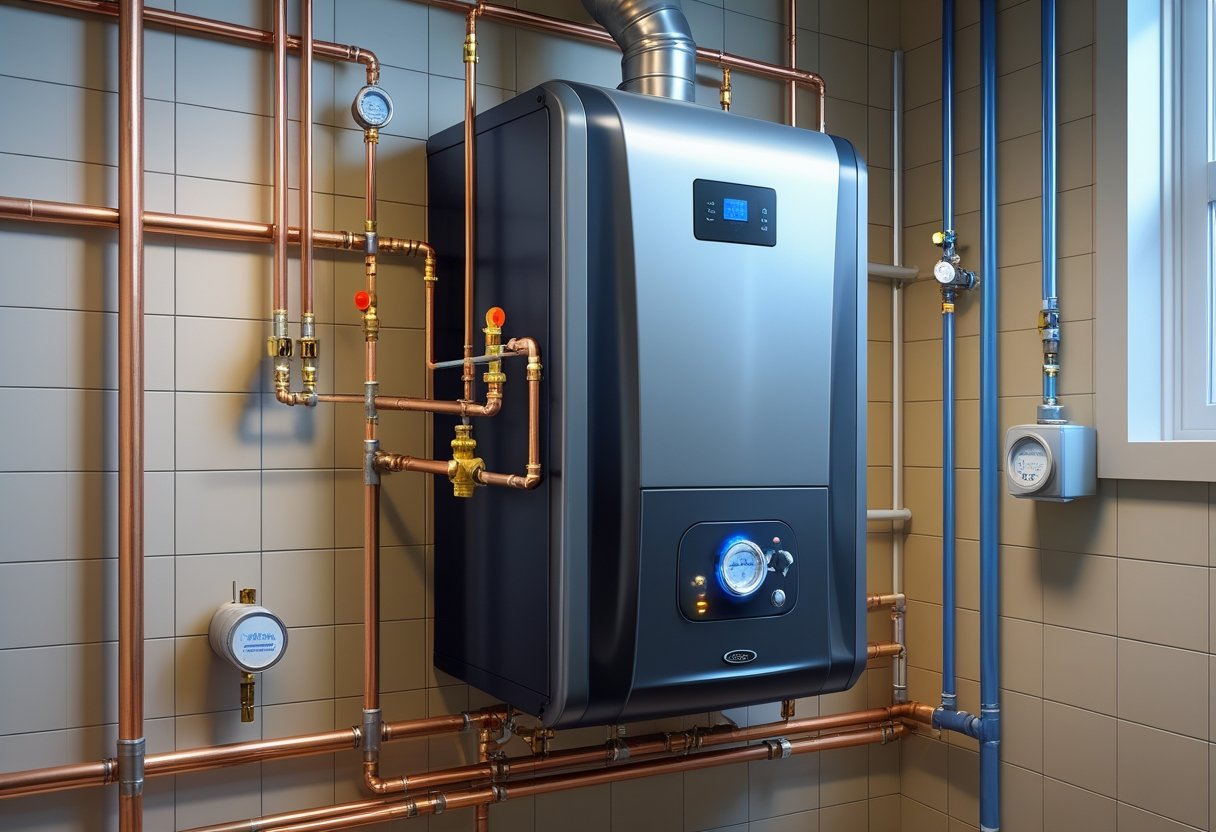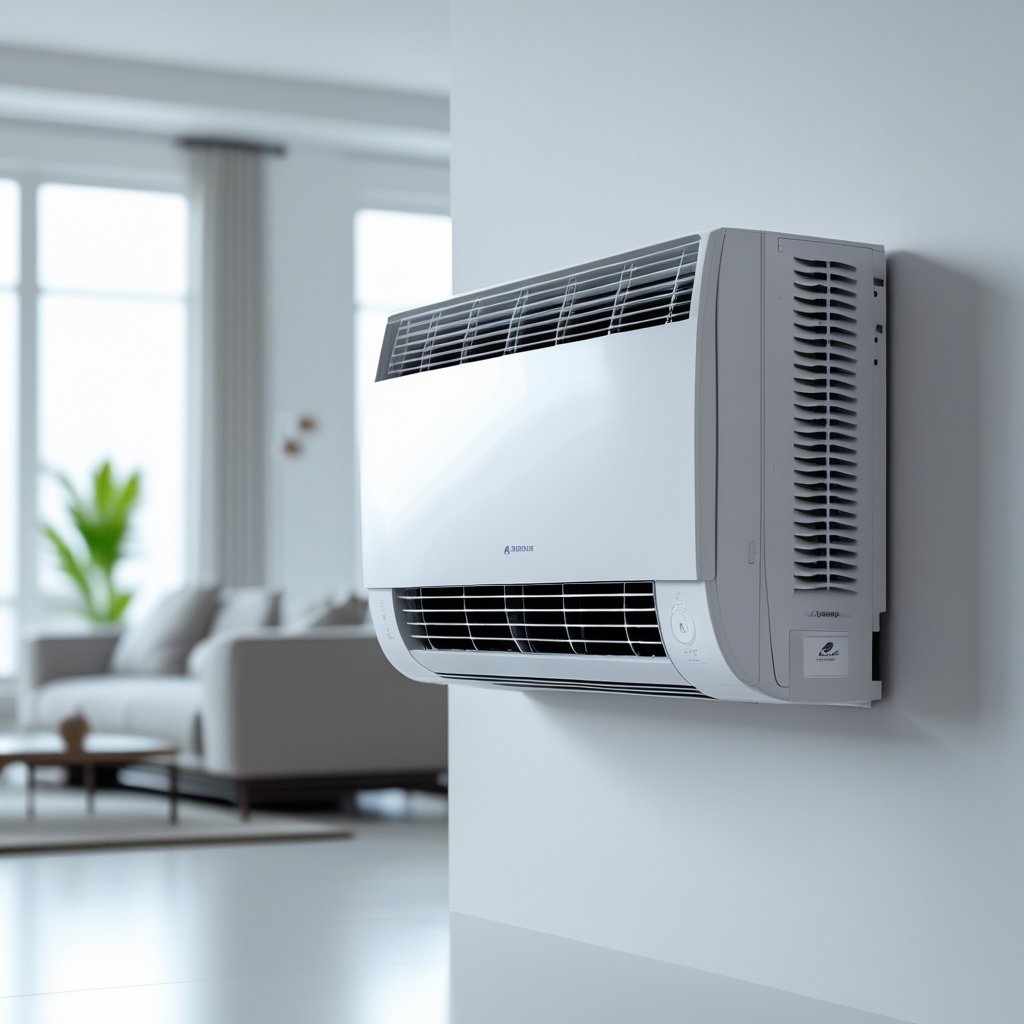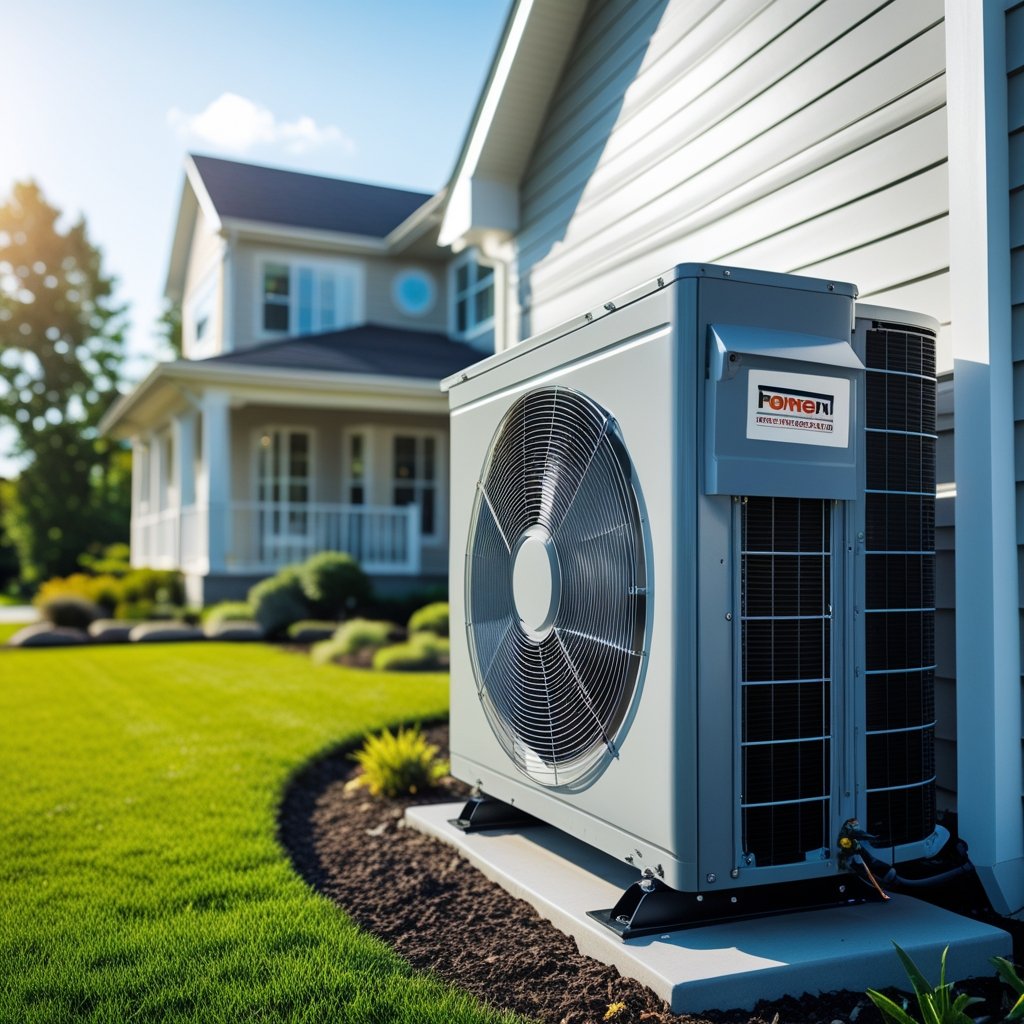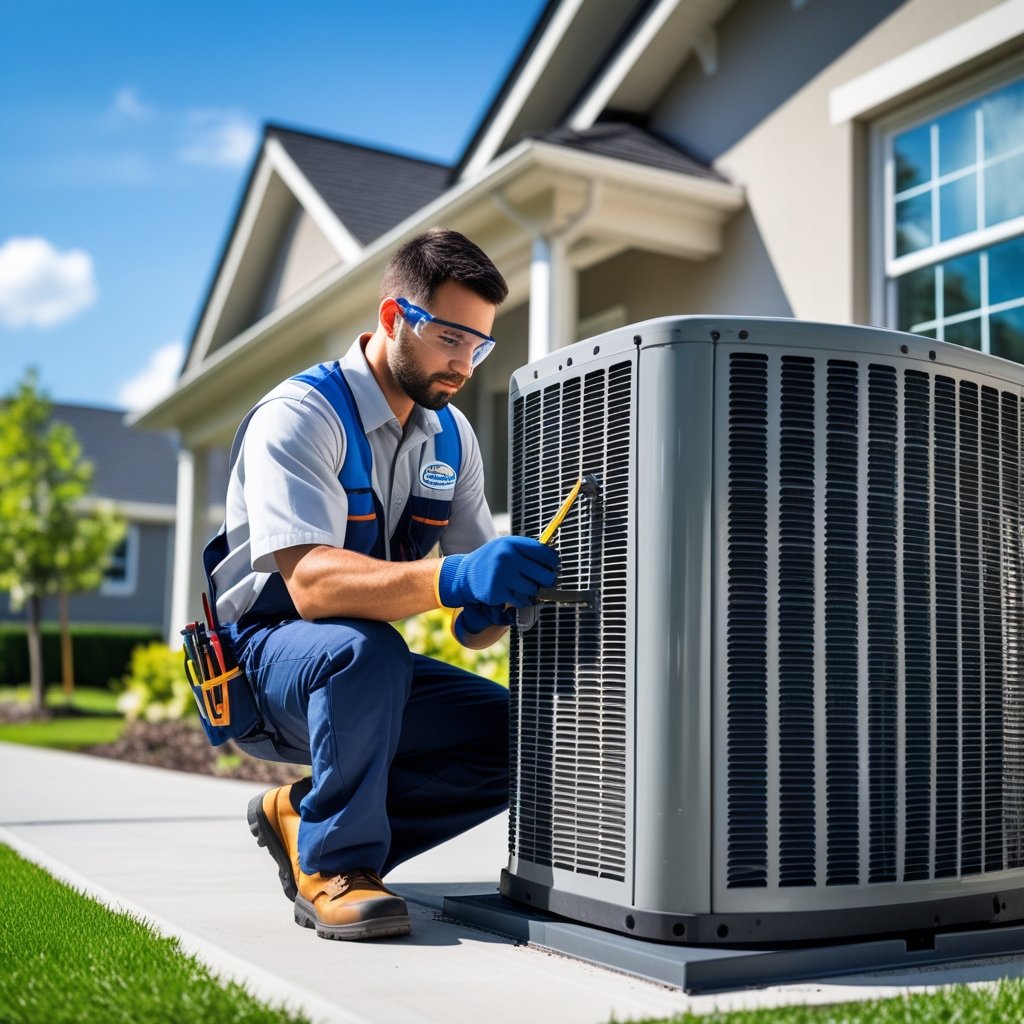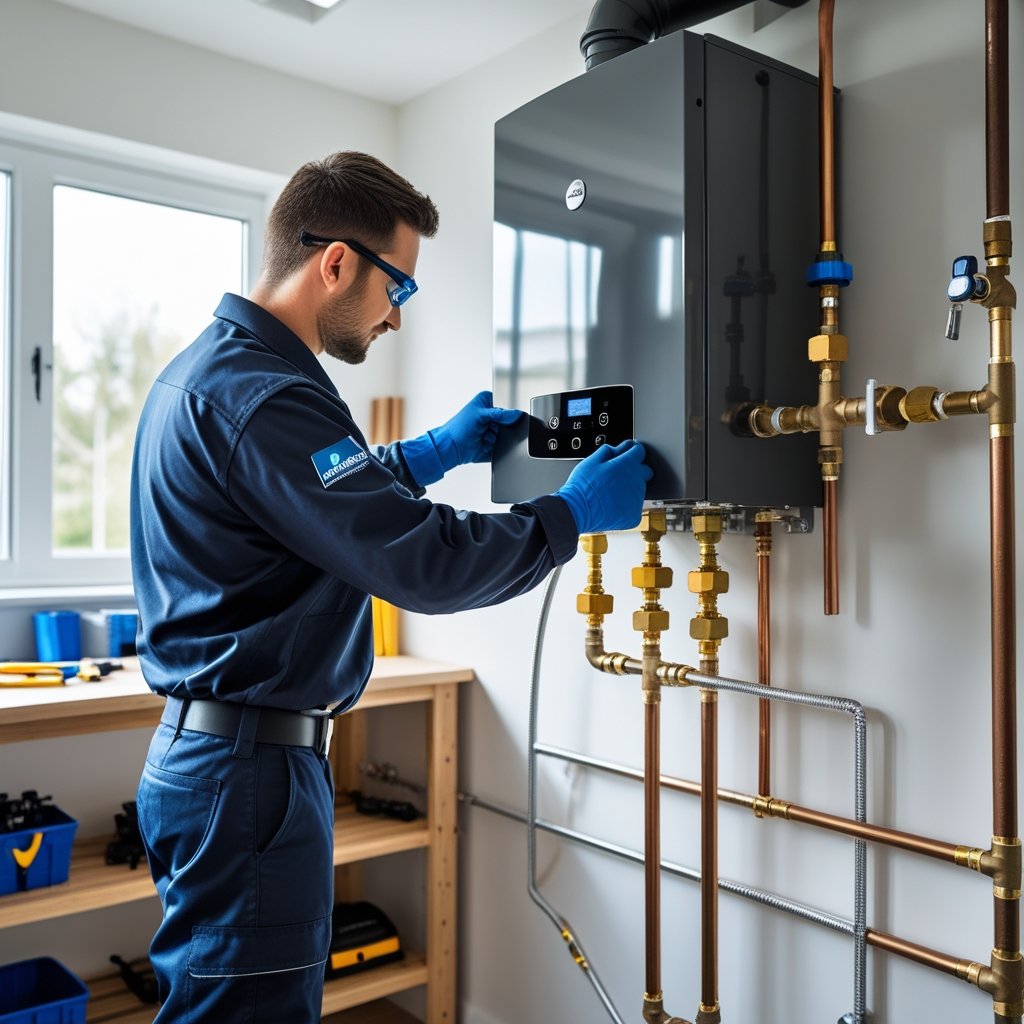If you're thinking about how to heat your water efficiently, gas water heating boilers might be the solution you need. These boilers use natural gas to warm water quickly and keep it ready for your home or business, offering reliable heat at a lower cost than some electric options. Choosing the right system can save you money and make your daily routines more comfortable.
When it comes to maintaining a gas water heating boiler, regular care is key to keeping it running smoothly and safely. At Leo Kob Co., we’ve helped customers in South Central Pennsylvania since 1904 with expert plumbing and HVAC service to ensure their boilers last longer and work better. If you know how your boiler works and when to schedule maintenance, you’ll avoid a lot of hassle and unexpected repairs.
Depending on your needs, a gas boiler can be a smart choice for heating water in your home or commercial space. From energy savings to dependable performance, these systems balance comfort and cost. Let’s dig into what makes these boilers tick and how you can get the most out of yours.
What Are Gas Water Heating Boilers?
Gas water heating boilers use natural gas to heat water for your home or business. They provide hot water for heating and sometimes for your taps. If you get a handle on their parts and how they work, you’re already ahead in choosing and maintaining the right setup.
Definition and Core Functionality
A gas water heating boiler uses a gas burner to heat water, which then travels through pipes to radiators, underfloor heating, or hot water faucets. That’s how it keeps your place warm and supplies hot water for daily stuff.
The boiler burns natural gas, generating heat that warms the water inside. Heated water moves through your building’s heating network. Once it cools off, it circles back to the boiler for another round.
Compared to electric or oil boilers, gas boilers usually heat water faster and are often more affordable to run, especially in regions like South Central Pennsylvania where natural gas is easy to get.
Key Components
Gas boilers have a few main parts:
- Burner: Burns the natural gas and makes heat.
- Heat exchanger: Transfers that heat from the burner into the water.
- Circulator pump: Moves hot water around your pipes to the heating system.
- Thermostat: Keeps the water at a safe, steady temperature.
- Flue: Sends exhaust gases safely outside.
Regular cleaning and check-ups keep these parts working safely. Family-run companies like Leo Kob Co. really focus on this kind of care, which helps your system last.
How Gas Boilers Differ From Other Types
Gas boilers run on natural gas, which is usually cheaper than electricity or oil. They heat water quickly, so you get steady warmth—a big plus in places like Harrisburg and Lancaster.
Electric boilers don’t make fumes, so they’re easier to stick in tight spaces, but they can cost more to run. Oil boilers need you to store and order fuel, which isn’t always convenient.
Gas boilers often have better energy efficiency and may qualify for rebates or incentives that bring your upfront costs down. Leo Kob Co. can help you sort through your options and find what fits your budget.
Types of Gas Water Heating Boilers
Gas water heating boilers come in a few different styles, each with its own perks and quirks. You’ll see options that handle hot water and heating in different ways, depending on your space and how you use hot water.
Combi Boilers
Combi boilers are compact and efficient. They heat water straight from the gas supply, so you don’t need a separate hot water tank. You save space and get hot water whenever you need it.
These are great for smaller homes or apartments because they handle both heating and hot water in one neat unit. But if you’ve got a busy household with lots of showers running at once, a combi boiler might not keep up.
Maintenance matters here—Leo Kob Co. keeps plenty of customers’ combi boilers humming along with regular service.
System Boilers
System boilers use a hot water cylinder but skip the old-school cold water tank. This setup stores hot water so it’s ready when you need it, which is handy if you have a couple of bathrooms or a high demand for hot water.
They’re easier to fit in homes with limited space since you don’t need extra tanks in the attic. They pull heat from the gas supply and store hot water at high pressure.
If you want steady hot water and balanced energy use, a system boiler could be the sweet spot. Leo Kob Co. handles installations and tune-ups for these all the time.
Conventional Boilers
Conventional (or regular) boilers use both a hot water cylinder and a separate cold water tank. This system stores hot water so you can run several taps or showers at once.
They need more space because of the tanks, but they’re reliable—especially for homes with older pipes or high water needs.
Conventional boilers aren’t as efficient as newer styles, but they’re often easier to repair in older homes. Regular maintenance helps keep problems and energy bills down.
If you’re in South Central Pennsylvania, Leo Kob Co. can help you weigh your options and keep your system in shape.
How Gas Water Heating Boilers Work
Gas water heating boilers heat water by burning natural gas. This hot water moves through pipes to your heating system or taps. The process relies on careful control of combustion, heat transfer, and water circulation to keep things safe and efficient.
Basic Operation Process
A gas water heating boiler starts up when the thermostat calls for heat. The burner lights, creating a flame that heats the water in the tank or heat exchanger.
Water circulates through the boiler, picks up heat, then moves out to radiators, baseboard heaters, or taps. When it cools off, it heads back to the boiler to warm up again. This cycle just keeps going, keeping your place cozy or your showers hot.
Heat Exchanger Function
The heat exchanger keeps the burning gas and flame separate from the water. Hot gases flow through metal tubes, warming the water around them.
This part is all about efficiency—getting as much heat from the gas into the water as possible. It’s built tough to handle heat and avoid leaks. If you keep it clean and check for corrosion, you’ll avoid a lot of headaches.
Fuel Source and Combustion
Gas boilers run on natural gas piped into your home. The fuel burns cleanly and is easy to control. When gas mixes with air, the burner produces a steady flame.
Combustion makes heat and exhaust gases, which exit through a vent or chimney. Good ventilation is a must—nobody wants carbon monoxide or fumes building up.
If you want honest, reliable service for your gas boiler in South Central Pennsylvania, Leo Kob Co. has been family-owned since 1904, and they focus on doing the job right.
Benefits of Using Gas Boilers
Gas boilers bring a bunch of perks—energy savings, lower heating costs, and reliable heat all winter. Their efficiency and steady performance make them a solid choice for homes around South Central Pennsylvania.
Energy Efficiency
Gas boilers heat water quickly and don’t waste much fuel compared to older systems. Gas burns cleaner and heats more evenly, so your system runs efficiently. That means less fuel used and lower bills.
If you keep your boiler maintained, you can cut energy use by up to 15%. That’s good for your wallet and the planet.
Cost-Effectiveness
Switching to gas usually means lower heating bills. Natural gas prices are often lower and more stable than oil or electricity, so gas boilers make sense for a lot of budgets.
Sure, the upfront install cost might be higher, but you’ll probably save over time with lower fuel bills and fewer repairs. Gas boilers also tend to last longer than some alternatives, so you’re not replacing them as often.
Leo Kob Co. can help you break down the numbers and find a system that fits your home and budget.
Consistent Performance
Gas boilers deliver steady heat and hot water, even when it’s freezing out. Some systems can sputter in the cold, but gas boilers just keep chugging along.
They’ve got advanced controls and safety features to keep things running smoothly. You get hot water when you want it and warmth throughout the house.
Fewer breakdowns and regular checkups mean you’re less likely to get caught with no heat. Leo Kob Co.’s techs keep these systems safe and reliable, year after year.
Choosing the Right Gas Boiler for Your Needs
Picking the right gas boiler depends on how much heat you need, your home’s style, and whether the unit meets local rules. These details matter if you want a system that’s efficient, lasts, and keeps everyone comfortable.
Sizing and Capacity
You’ve got to choose a boiler that matches your home’s size and heating needs. Too small, and you’ll be chilly. Too big, and you’re just wasting money and gas.
Heating demand is usually measured in BTUs. Most homes need somewhere between 40,000 and 150,000 BTUs, depending on square footage, insulation, and climate.
Professional installers—like Leo Kob Co.—look at your rooms, insulation, and hot water use to suggest the right size. Getting this right saves energy and keeps bills down.
Home Suitability
Not every boiler fits every house. Some work better in older places with traditional radiators, while others are made for newer homes with underfloor heating.
If your house is older and a bit drafty, you might need a boiler with more oomph to stay comfortable. Newer, well-sealed homes usually need less.
Space is another thing. Some boilers are compact and wall-mounted, while others take up more room. If your basement or utility room is tight, that matters.
Leo Kob Co. can help you pick a boiler that fits your home’s layout and existing system, so you don’t have to make expensive changes later.
Regulations and Certifications
Gas boilers have to meet strict safety and efficiency rules. Certified boilers follow these standards and can qualify for energy rebates.
Look for ENERGY STAR® or state-approved models. These use fuel more efficiently, which saves you money in the long run.
Installation by a licensed contractor is required. Leo Kob Co. handles this in South Central Pennsylvania, making sure your system meets all codes.
Check with your local building department to see what permits or inspections you’ll need. Following these rules keeps your family and home safe.
Installation of Gas Water Heating Boilers
Installing a gas boiler takes planning, the right tools, and attention to safety. You want it to run efficiently and last for years. Here’s what’s involved.
Professional Installation Process
Trained technicians should always install gas boilers. They’ll check your home’s needs and the space for the boiler, remove old equipment, and prep the area.
During the install, they connect gas lines, water pipes, and electrical wiring. The boiler gets placed securely and hooked into your system. Then, they test everything to make sure it’s working and leak-free.
Going with a local pro like Leo Kob Co., who’s been around since 1904, means you get a safe, solid installation.
Safety Precautions
Safety’s huge when you’re dealing with gas. Before starting, techs check gas lines for leaks and make sure there’s enough ventilation.
They use gas detectors and pressure tests to double-check everything. Adding smoke and carbon monoxide detectors is a smart move, too.
Never try to install or fix a gas boiler yourself—it’s just not worth the risk. A pro will follow all codes and manufacturer instructions to keep your home safe.
Required Tools and Equipment
Installing a gas boiler takes some specialized gear:
- Pipe wrenches and tubing cutters for plumbing connections
- Gas leak detectors for safety
- Screwdrivers and drills for assembly
- Pressure gauges to test the system
- Venting tools for safe exhaust installation
Techs also use protective gear and tools for electrical work. Having the right stuff helps avoid mistakes and gets the job done faster.
If you want it done right, Leo Kob Co. has the experience and tools to handle your installation from start to finish.
Maintenance and Troubleshooting
Keeping your gas water heating boiler in good shape takes regular attention and a bit of know-how when things go sideways. Check and clean parts often, get familiar with common problems, and try a few habits that help your boiler stick around longer.
Routine Maintenance Tasks
Take a look at your boiler’s pressure gauge every month. You want the pressure to hover between 12 and 15 psi—too high or too low, and things just won’t work right.
Once a year, flush the boiler to clear out sediment. That stuff builds up and can really clog things, making your system less efficient. Every few months, clean or swap out the air filter so the air keeps moving.
Check the pilot light or ignition system now and then. If the flame looks weak or goes out, you might have a dirty burner or a gas supply hiccup. Don’t mess around with gas—call a pro like Leo Kob Co. to check those parts safely.
Common Issues and Solutions
Strange noises—banging, whistling, that sort of thing—usually mean trapped air or limescale build-up. Bleed the radiators to let air out, and if you’ve got hard water, descaling the system is worth considering.
Leaks around the boiler or pipes can drop the pressure. Look at seals and joints for damage. Tightening things up or swapping a part might fix a small leak, but bigger issues? Better call someone who knows what they’re doing.
If your hot water keeps running out or isn’t heating evenly, double-check the thermostat and zone valves. Sometimes you’ll need to repair or replace a faulty valve or a busted thermostat.
Longevity Tips
Yearly checkups with a reputable company can really stretch your boiler’s lifespan. Leo Kob Co. offers inspections that catch little problems before they turn into headaches.
Keep the area around your boiler tidy—dust and clutter don’t help performance. And don’t keep turning the boiler on and off; constant cycling just wears out the parts faster.
Thinking about going for a combi-boiler? They’re energy-efficient and take up less space. Still, even the best ones need annual servicing to stay dependable.
Environmental Impact of Gas Water Heating Boilers
Gas water heating boilers run on natural gas, so they do have an environmental footprint—mainly from emissions and energy use. The good news? Newer systems are way more efficient, so they’re easier on the planet and still get the job done.
Emissions and Efficiency
Gas boilers put out carbon dioxide (CO2), which isn’t great for the environment. If your boiler’s old or not well maintained, it’ll produce more emissions, especially if combustion isn’t complete. You might notice uneven heating or higher gas bills if things aren’t running right.
Efficiency is a big deal here. The better your boiler runs, the less gas it burns for the same amount of hot water. Modern boilers often hit efficiency ratings over 90%. That’s less fuel and fewer emissions.
Regular tune-ups help keep things efficient. Leo Kob Co. does boiler checkups that can catch leaks or weird noises—signs that something’s off.
Modern Eco-Friendly Innovations
Today’s gas boilers come with smart features to shrink their environmental impact. Condensing boilers, for example, grab extra heat from exhaust gases that older models just waste. That means better efficiency and less fuel burned.
Some boilers have smart controls that adjust the heat based on your habits, so you’re not wasting energy when you don’t need hot water.
You might even get rebates or incentives for choosing greener models. If you’re in South Central PA, Leo Kob Co. can help you find eco-friendly options that make sense for your house and your wallet.
Cost Overview and Savings
It helps to know what you’re getting into when it comes to the cost of gas water heating boilers. Upfront price, ongoing bills, and rebates all play a part in what you’ll spend over the years.
Initial Investment
Gas water heating boilers usually cost more to buy than electric ones. At Leo Kob Co., a combi-boiler starts around $9,000, including installation.
Prices swing depending on the boiler’s size, brand, and how tricky the installation is. You’ll need a licensed tech for a safe setup. Going with a quality system means fewer headaches and better efficiency as time goes on.
Running Costs
Gas boilers tend to be more energy-efficient than electric heaters, so your monthly bills should be lower. That’s especially true in places like South Central Pennsylvania, where gas is easy to get.
Keep up with maintenance to keep things running smooth and avoid surprise breakdowns. Leo Kob Co. offers plans that include annual checkups, scheduling perks, and repair discounts. Staying on top of this stuff helps keep your heating costs predictable.
Potential Rebates and Incentives
You can often get rebates and tax credits for installing energy-efficient gas boilers. These incentives help offset the upfront cost and make greener choices more appealing.
Eligibility depends on where you live and what programs are running. It’s worth checking with your utility or state energy office. Leo Kob Co. can walk you through what’s available and even help with the paperwork, making it easier to save.
Upgrading or Replacing Older Gas Boilers
If your gas boiler’s getting old or just isn’t keeping up, maybe it’s time for an upgrade. New models use energy better and can help lower your bills. Knowing the warning signs and benefits can help you make a solid decision.
Signs It’s Time to Upgrade
If your boiler takes forever to heat the house or water, that’s a red flag. Frequent repairs are another sign it’s on its last legs. Boilers over 15 years old are usually much less efficient than newer ones.
Other hints? Odd noises, uneven heating, or a jump in your gas bill even though your usage hasn’t changed. In South Central PA, an inefficient boiler can really sting during those long winters.
Benefits of New Models
Modern gas boilers are designed to save energy and money. They heat water faster, use less fuel, and often combine heating and hot water (hello, extra closet space).
If you go with Leo Kob Co. for installation, you’ll get expert service and quality work. Many new systems qualify for rebates, which helps with the upfront cost. Upgrading can make your home more comfortable and reliable for years to come.
Frequently Asked Questions
When you’re picking and maintaining a gas water heating boiler, think about cost, durability, and whether it’ll work with your current setup. You’ll want to know what you’ll pay, how long it’ll last, and any common drawbacks. And can a single boiler handle both hot water and baseboard heat? Let’s dig in.
What is the best natural gas boiler for home heating?
The best gas boiler for your place depends on size, efficiency, and features you want. Look for models with high AFUE ratings—above 90% is great. Condensing boilers are a solid pick since they use fuel efficiently and can lower your heating bills.
How much should I expect to pay for a gas water heating boiler?
Prices usually fall between $2,500 and $5,000, depending on the boiler’s size and efficiency. Installation costs are extra. Your final price depends on brand and local labor rates in South Central PA.
What are the common drawbacks of using a gas water boiler for home heating?
Gas boilers need regular maintenance to stay safe and efficient. They require proper ventilation and sometimes make noises—hissing or banging—if something’s off. Interruptions in natural gas supply can also leave you without heat.
How long can I expect my gas hot water boiler to last?
With good care, a gas boiler should last 15 to 20 years. Keeping up with service and inspections can stretch its life and help you avoid unexpected repairs.
How much does it cost to install a gas boiler for a 2000 square foot house?
For a 2000 square foot home, installation usually runs between $4,000 and $7,500. That covers labor, permits, and any upgrades you might need for your home’s heating system.
Can a gas boiler be used for both hot water and baseboard heating?
Absolutely, a lot of gas boilers can handle both your home’s hot water needs and keep those baseboard radiators warm. It’s a smart way to save space and energy—though honestly, making sure the system’s sized and installed right is crucial. If it’s not, you’re just asking for trouble down the line.
If you’re around South Central Pennsylvania and want someone who knows their stuff, Leo Kob Co. does solid work on gas boilers and heating systems. They won’t gouge you, either.

